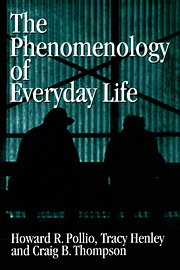Book contents
- Frontmatter
- Contents
- Preface
- PART I EXISTENTIAL PHENOMENOLOGY AND THE SCIENCE OF PSYCHOLOGY
- PART II GROUNDING THE WORLD OF EVERYDAY LIFE
- PART III SELECTED TOPICS FROM EVERYDAY LIFE
- 6 Feeling Alone
- 7 Making Amends: The Psychology of Reparation
- 8 Love and Loving
- 9 Falling Apart
- 10 The Meanings of Death in the Context of Life
- PART IV THE PHENOMENOLOGY OF EVERYDAY LIFE
- References
- Name Index
- Subject Index
6 - Feeling Alone
Published online by Cambridge University Press: 04 August 2010
- Frontmatter
- Contents
- Preface
- PART I EXISTENTIAL PHENOMENOLOGY AND THE SCIENCE OF PSYCHOLOGY
- PART II GROUNDING THE WORLD OF EVERYDAY LIFE
- PART III SELECTED TOPICS FROM EVERYDAY LIFE
- 6 Feeling Alone
- 7 Making Amends: The Psychology of Reparation
- 8 Love and Loving
- 9 Falling Apart
- 10 The Meanings of Death in the Context of Life
- PART IV THE PHENOMENOLOGY OF EVERYDAY LIFE
- References
- Name Index
- Subject Index
Summary
The term aloneness may be understood in many different ways. In the simplest case, other people are physically absent. Despite this state of affairs, not everyone will experience a sense of aloneness, especially if other people are imagined or if the person has no desire to be with them at that moment. Similarly, a person may be surrounded by other people and still experience an uncomfortable sense of being alone, particularly if he or she feels excluded from participating with them in a meaningful way. Aloneness does not refer to an objective circumstance but to a psychological mode of being, and whether it is experienced as pleasurable or painful, problematic or liberating, always depends upon the meaning that each specific situation has for the person undergoing it.
Being alone is not only a common human condition but one so close to what human existence is about as to be inevitable and unavoidable. As Paul Tillich (1963) noted:
[Man] is not only alone; he also knows that he is alone. Aware of what he is, he therefore asks the question of his aloneness. He asks why he is alone and how he can overcome his being alone. He cannot stand it either. It is his destiny to be alone and to be aware of it. Not even God can take away this destiny from him.
(p. 15)In examining prior work on aloneness, four major perspectives can be discerned: psychodynamic, sociological, existential, and phenomenological. From a psychodynamic perspective, aloneness is frequently characterized as a condition of the person, and sources of aloneness are sought both in the intrapsychic world and in the developmental history of the individual.
- Type
- Chapter
- Information
- The Phenomenology of Everyday LifeEmpirical Investigations of Human Experience, pp. 157 - 190Publisher: Cambridge University PressPrint publication year: 1997
- 3
- Cited by



